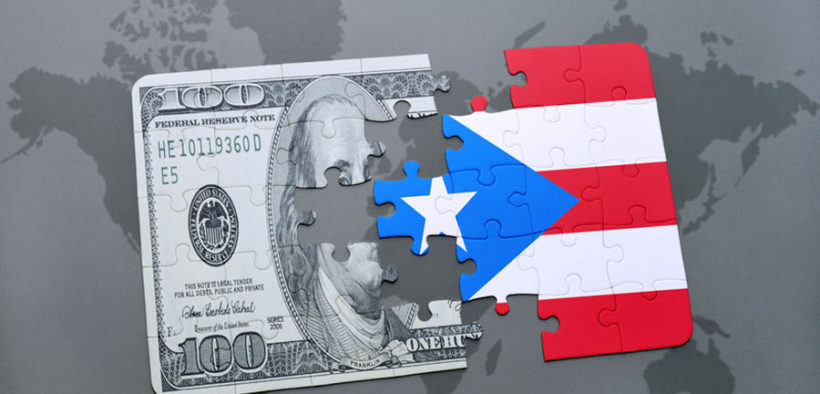Op-Ed: ’22 brings issues that will be ‘under the radar’ but must be closely watched

As the new year begins and faced with the uncertainty caused by the current local and global situation, the Center for a New Economy (CNE) has taken a look at what 2022 has in store.
In the January edition of the CNE Review, which circulates today, its editor, Sergio M. Marxuach, addresses issues that will be under the radar and should be closely watched: the pandemic, Puerto Rico’s debt restructuring, post-hurricane Maria reconstruction, the mid-term elections and the return of geopolitics.
From Marxuach’s analysis, who is also CNE’s policy director, the following observations emerge:
The pandemic — The SARS-CoV-2 virus has consistently confounded some of the brightest scientific minds since it was first identified two years ago. It is also true, though, that our knowledge about the virus has grown exponentially during that time. In addition, we also have a better clinical understanding of the disease’s progression and have developed vaccines as well as new treatments for COVID-19. Nonetheless, we still have a way to go before we can claim that COVID-19 is just another disease we can live with, like the flu. This is particularly true in the global South, where vaccination rates are still pitifully low. In the meantime, we know what we must do: wear masks, keep social distancing, get vaccinated, and carry on.
Puerto Rico’s debt restructuring — After five years of litigation and negotiation, Judge Laura Taylor Swain has confirmed a Plan of Adjustment for the debt of Puerto Rico’s central government. The proposed Plan of Adjustment is not perfect, and it has been the subject of significant criticism. But it does offer some debt relief and lifts the bankruptcy cloud from Puerto Rico, which should be a net positive for people looking at potential investment in Puerto Rico. It is a really difficult task to determine, with any certainty, whether the proposed plan is adequate, the time horizon is too long and there are too many variables. We believe that both the best-case scenario put forward by the FOMB and the worst-case scenario favored by those who oppose the Plan are unlikely to occur.
In real life, it is likely some things will be in our favor and others against. The difficulty lies in forecasting which variables will go which way. What we do know, is that everything depends on jumpstarting economic growth and that depends, in the short term, on the Hurricane Maria reconstruction process and, over the long term, on developing and implementing an economic growth plan for Puerto Rico.
Hurricane María reconstruction — It appears that 2022 will finally be the year when we start to see some significant new spending on reconstruction projects, especially in the housing and energy sectors. Hopefully, some of the obstacles imposed by the federal government have been cleared and the money can start flowing.
Some difficult decisions regarding what gets rebuilt and what not and about energy generation technologies still lie ahead, though. In this sense, some of the most difficult questions in the reconstruction process are not technical but rather political in nature, as different groups vie with each other to push their own (interested) vision of how the reconstruction should play out.
Mid-term elections — The entire U.S. House of Representatives and about a third of the Senate are up for reelection this fall. Most analysts and polls forecast that Republicans will gain control of at least one Congressional chamber, if not both. If that scenario is realized, any pending federal legislation extending or increasing federal spending in Puerto Rico, for example, extending SSI benefits to Puerto Rico or increasing the federal share (FMAP) of Medicaid costs, could be in jeopardy. In addition, under a Republican majority, Puerto Rico could even face the rescission of budgetary authority for certain programs, or the reduction of funds already appropriated for certain uses.
Thus, it is important that the Pierluisi administration move aggressively to push the Puerto Rican agenda in Washington, D.C. during the next few months. Once campaigning starts in earnest after the summer break, it may be too late.
Inflation — Consumer prices are increasing at a rate not seen in 40 years. This is due, in part, to the success of economic support measures in propping up demand when the COVID-19 pandemic struck. Central bankers provided huge amounts of liquidity to financial markets. Governments borrowed on a scale unseen since the second world war. In the United States alone, budget deficits exceeded 12% of GDP in both 2020 and 2021.

All this stimulus prevented demand from plunging. Supply has been a different story, as the pandemic disrupted production worldwide. Supply chain bottlenecks and scrambled logistic networks led to unprecedented backlogs and delays, even as demand for physical goods increased relative to demand for services as people sheltered in place. Hence the price increases. In addition, firms in the developed world face a labor shortage, as workers, for reasons we don’t really fully understand, don’t return to work — there are 3.6 million fewer people working in the United States today than in February 2020.
Economists disagree (big surprise here) as to whether this recent inflationary trend is a temporary or permanent phenomenon. On the former camp are those who emphasize supply dislocations that should eventually reverse themselves, while those on the latter side point to the risk of an inflationary wage spiral taking hold. Jay Powell, chairman of the Federal Reserve, stated recently that he (and the Fed Board of Governors) are uncomfortable with current price trends and the expectation is that interest rate increases are in the offing. It remains to be seen whether the Fed can tame inflationary pressures without inducing a recession or provoking a plunge in asset prices.
The return of geopolitics — As 2022 begins, Russia is threatening to invade Ukraine, China is taking an increasingly assertive position in the South China Sea, and North Korea has tested new missiles. In addition, illiberal autocratic forces seem to be on the rise around the world. The strength of these movements will be tested in general elections in Brazil, France, Hungary, and in the midterms in the United States.
At the same time, China is increasingly confident that its system is superior at promoting stability, growth, and innovation, especially in contrast with a divided and dysfunctional United States. Any intensification of the rivalry between China and the US will affect us, as Puerto Rico’s future, for better or worse, is tied to the United States.














